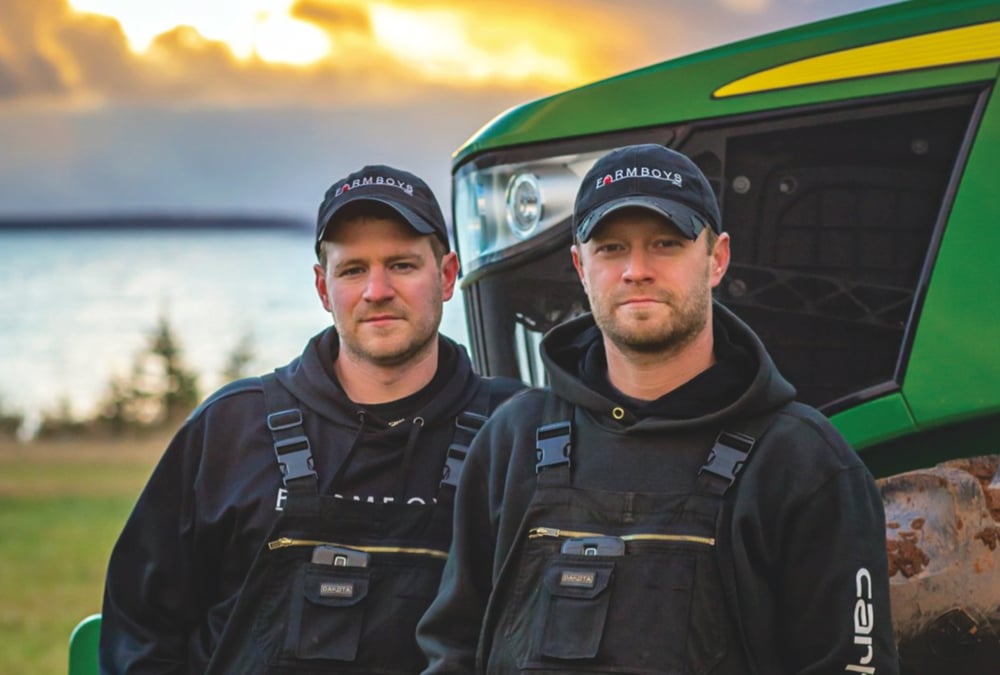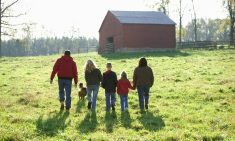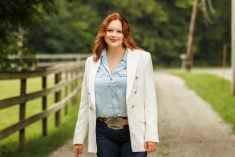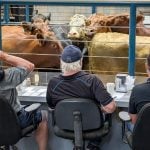It all makes perfect sense. When, two days before their eighth and 10th birthdays, brothers Bryan and Kyle Maynard lost their dad, Kent, in a tragic farm accident, of course the future of the farm was thrown into disarray.
Kent had grown up nearby on a Prince Edward Island dairy and hog farm, but in the early 1980s had decided to farm alongside his wife’s father, Allison Dennis, on their 3,200-acre potato and grain operation near Arlington, not far from Summerside.
Although there was never any written transition plan, as the years went by, everyone in the family generally accepted that when his father-in-law eventually retired, Kent would take over.
Read Also

‘No agenda, no attenda’: How to professionalize your family farm meetings
Establishing meeting ground rules can help a farm family find ways to communicate that work for the business and the family.
So when Kent died at the age of 33, everything seemed up in the air. “It changed our grandfather’s mindset,” says Bryan, now 37. “He didn’t have a son-in-law on the farm anymore, and when you look at your grandkids at the ages of eight and 10, it’s hard to know whether you’re looking at farmers or not.
“He didn’t know what was going to happen to the farm, he just knew that he had to keep farming.”
Bleak, bleak, bleak
The boys grew up helping out on the farm until they graduated high school and went to college, Bryan taking business administration at the local community college, and Kyle taking a precision machining program, both with hopes and dreams of returning to the farm.
But whenever they raised the idea of coming back to farm with their grandfather, he strongly discouraged them.
“All of my life, every time that I would bring up farming as a future, I was told that was not a smart thing to do, that I should get off the farm, go get something more secure, farming isn’t an easy life, etc.” says Bryan. “Transition was never a conversation that was openly discussed because nobody in the family thought there was a future at the farm for Kyle and for me, and that made us second guess whether we had a future here.”
In Kyle’s case, Dennis told him he would prefer to see him continue after college in the trades rather than return to the farm. “He’d had a rough life on the farm and he didn’t think there was much of a career there for both of us, so I went on to get my red seal certificate and got a job with an aerospace company, where I worked for almost 10 years,” says Kyle.
Bryan did come back and work full-time on the farm after college, and was still working there when his grandfather began wrestling with dementia. This also raised the spectre of farm transition, something no-one had yet planned or prepared for.
“As far as a succession plan here, there was none,” says Bryan. “I worked 10 years here after school with my grandfather for a paycheque at the end of the week. There was no sweat equity, there were no shares in the farm that I was working towards buying, it was just a job.”

No plan, no money
Something had to happen, and, as has happened on so many farms across Canada (and still happens) the family was left trying to sort out their next steps.
“It was brought up to all the family members that if they were interested in farming, speak now because it was going to be sold,” says Kyle.
“Bryan and I were both interested in it, so we decided to try and see what we could do.”
That got a lukewarm response at first. Again, it’s a familiar story. The family members simply didn’t think the brothers would be able to raise the money to purchase the farm.
It’s how their grandfather had always talked. “He was running the operation with an adequate cash flow and not a lot of debt,” says Kyle. “He’d always said there was a generation missing on the farm, so it was going to have to go to his six kids and they were likely going to sell it… he didn’t think we could afford to run the farm if we had to assume that much debt.”
The family struggled to see how Bryan and Kyle would find a bank willing to back them. “It was a large ask,” Kyle agrees. “We were turned down a few times.
“But luckily, we had one bank that was willing to finance the purchase and another one willing to give us an operating loan. When we went to the family and said we have somebody to lend us money, it got a lot more serious. They’ll say to this day they still can’t believe that we were able to do it.”
The right alignment
It had helped that they had a small 20-acre parcel that their mother, Brenda, had gifted to them when their dad passed away, so they at least had a little collateral to start with. And a few other things lined up too, like the experience they already had on the farm, and that they had a secure, dependable market for their main crop.
Their grandfather had sold all of his potatoes to one local processor and had developed a strong relationship there. When the processor agreed to write a letter for the brothers committing to purchase all of their potato production, it was a major turning point with the banks.
“It definitely helped when the banks knew that essentially this was a changing of the guard. This farm was going to continue doing the same thing it was always good at doing, which was growing potatoes, and it was going to sell them to the same customer it had always sold to,” says Kyle.
Really, says Bryan, the banks were justified in emphasizing that idea of continuity.
“I don’t think Kyle and I could be as successful as we are today without those years of experience,” says Bryan. “There are many agronomy and biology courses, and tools out there that will help you become a more educated farmer and you definitely need to broaden your horizon and take as many of those courses as you can. But the time spent on the farm working for minimum wage when you’re 15 years old is probably the most valuable time that you will ever spend. You don’t know it at the time, and you complain about the hard work, the long hours and the minimal pay, but once you get into the captain’s chair, you’ll refer back to your knowledge learned in those years almost every waking moment.”
Six months to get it done
Once the family knew they were serious and could get the financing, the transition process began. It was rough and fast.
“This happened after the fall of 2014 and the sale went through in February of 2015, so we had to get all of our ducks in a row in five or six months,” says Kyle.
Because the family had already had the farm appraised, they had a price tag on every piece of land, building and piece of equipment, which meant Bryan and Kyle had to try and figure out what they could afford to purchase. It was a situation that could have caused a lot of acrimony, but everyone approached the transition on a professional basis, something that is good advice for anyone negotiating a family farm transition to remember. “When you went into the negotiating table, you put your business hat on and forgot about everyone having the same last name,” says Bryan.
In the end, the brothers bought just shy of three quarters of the farm, renaming their new farm business partnership FarmBoys Inc. “We agreed to not just cherry pick the best land, but drew a circle around the farm and bought everything inside that circle, so we got a little bit of a discount because of that,” says Kyle. “The family is still very close and our aunt did a good job of making sure that the sale was kept separate from family matters. It was a business deal.”
In order to get the financing, they had to prepare cash-flow statements and projections for the first three to five years, but that was relatively easy to do once they had access to their grandfather’s historical financial information and the certainty of stable markets and revenue. Of course, nothing in farming is ever certain, and all sorts of factors can cause a drop in revenue or costs to rise, so they did manage to negotiate some ways to manage a portion of their risk.
“We had options for our first couple of years that we could do interest-only payments on our debt if times were tough, so that allowed us a bit more flexibility with the cash flow if the crop was bad,” says Kyle. “We were lucky that we had a good crop in our first year, but if it had been poor, we had options to help soften the blow.”
Mistakes to not repeat
Looking back on it, the transition worked but it certainly wouldn’t be the way the brothers would want to do it if they had to do it again. In hindsight, they should have forced some of the difficult conversations that their grandfather had been unwilling to have a lot earlier than they did.
“The one thing that would have helped would have been if we had taken the bull by the horns earlier because, essentially, that’s what we did in the end and it worked,” says Bryan. “Nobody wants to talk to their father, mother or grandparents about what life’s going to be like and will I own the farm in 10 years, but you need to have that conversation because it’s going to take 10 to 15 years for you to be groomed properly and to buy in to the family farm. They’re too big now to leave it until the last minute like we did. It worked for us, but 99 out of 100 times if this was to happen again, it wouldn’t work.”
Kyle, who is 35, has attended a lot of conferences for young farmers, and he finds transition is always a hot topic around the table. His biggest advice for those young farmers is that the ball is in their court when they are dealing with the outgoing generation. They also can’t let themselves be deflected by the “you can’t afford it” attitude.
“People will use the excuse that ‘you don’t have any money.’ I worked (off the farm) for 10 years, and it’s true that there’s no way of saving up enough money to buy a farm, you’re going to need to borrow it,” he says. “I think you can force their hand a bit if you can say, here’s a banker willing to work with me, let’s have a serious conversation.”
They also feel they could have had more productive conversations with their own grandfather about taking over the farm if they had learned earlier how to see things more through his eyes and if they had been able to relate his experiences with their own.
“When you’re sitting there talking to an 80-year-old man and you’re potentially talking about borrowing $5 million, for example, it’s just amazing to him to think that someone could borrow that amount of money… he can’t fathom how that could be possible,” says Bryan. “Why would he? Through his career he’s seen where interest rates were up to 20 per cent in the early ’80s, and I can understand where he’s coming from. At the same time, I’m looking at it the other way because when he was my age, he was working for 75 cents a day and storing enough potatoes to fill the basement, not to fill 10.5-million-pound bins. Will we think that $5 million is a lot of money in 30 years? When I am sitting here and the next generation maybe wants to get into it, they might have to borrow $25 million, and I’m going to think that’s crazy!”
Although their grandfather would talk a lot about the hardships of farming over his 60-year career, he also told them that there was nothing else he would ever have wanted to do.
“That was the point that I think we probably could have stressed more,” Kyle says. “You say you don’t think it’s a great life, but you’d never do anything else. And we feel the same way.”
Lessons well learned
Their transition process, short and sharp as it was, plus their extensive experience on the farm means they have evolved into more confident farmers and business owners, and it has helped them with a recent expansion.
“We purchased another farm — not owned by family — last winter, and due to the fact that the first purchase we made, although it was from family, was very formal, professional and business orientated, it helped us in the last purchase,” says Bryan. “We were more seasoned.”
They certainly didn’t do things in a traditional way, but having a price tag that they knew they had to meet has made them understand how important it is for the outgoing generation to be transparent with the next about costs and other things that they need to know to be successful.
“There are some family farms that are guilty of keeping pricing to themselves, so Mom and Dad know what an acre of land costs and what the tractor payment every six months is, but they feel they are doing junior a big favour by keeping him kind of numb to the fact of how expensive it is,” says Bryan. “I don’t think they’re doing either party any favours because at some point junior is going to be making those payments and needs to know not only what it costs today, but what it will cost five years from now.”
Kyle handles the finances on the farm and says managing the cash flow and budgeting has allowed him to develop a good working relationship with their lenders.
“A lot of money gets flowed through farms today, inputs and equipment are expensive, so if you can show that you are on top of your finances and show you were able to meet your projections for revenue, or if costs were a little high, you have accounted for that moving forward, it makes your relationship with your banker a lot stronger,” says Kyle.
Teaching the next generation what not to do
In terms of the future, they intend to continue the legacy of their grandfather and are hopeful that one day there will be a fifth generation waiting to take over. They’ll be prepared, as Kyle and wife Krista have three children: Kate (8), Kent (5) and nine-month-old Klay. Bryan and his partner Ashley also have seven-year-old daughter Brynnley. But if that day ever comes, they fully intend to do things differently to make sure the next transition is easier for everyone.
“I hope that we never forget how we got here and that we make strategic decisions that will allow for our kids to enter the farm easier if they so choose,” says Bryan. “You can groom someone to be a farmer, but they need to have the want and the desire themselves, and if our kids have that, we hope we can make the next transition smoother and smarter. We will definitely teach them how not to do it because I would never want to see this family have to go through that again, whether I’m here or not.”
But they also know that the ball will be in their kids’ court one day too, and they are ready for that reality.
“The newer generation has to be educated enough and hungry enough to take the farm away from the older generation,” says Bryan. “You can’t hand it to them, you have to wait until they’re ready to take it from you.”
















